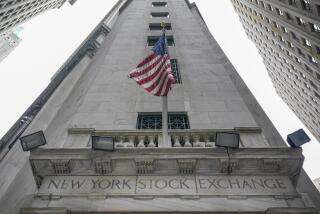‘Liquidity Crunch’ Fears Voiced
Has the economic and financial fallout from global markets’ recent declines just begun--or is the worst over?
Analysts wrestling with that question got a new jolt on Wednesday when BankAmerica Corp. disclosed trading and hedge-fund related losses that shocked Wall Street.
What’s more, two key government regulators on Wednesday raised new worries about a “liquidity crunch”--a shutdown of credit flows needed to keep the economy’s wheels moving:
* New York Federal Reserve Bank President William J. McDonough, speaking at a press briefing, said a shift toward caution by major banks and bond market investors is “excessive” and he hoped the trend would reverse soon.
“There are beginning to be some [signals] that the largest banks in the United States are restraining credit,” McDonough said. “There is very clearly a major shift toward risk aversion. My own view is the shift is excessive.”
* Deputy U.S. Treasury Secretary Lawrence Summers said the Treasury is concerned that liquidity may be drying up even in the market for government securities.
Yield “spreads” have widened in recent days between shorter-term Treasury bills and notes, and longer-term T-bonds. That’s particularly true for so-called off-the-run Treasuries, which are bonds that have been in circulation and now have shorter maturities and have been finding fewer buyers among nervous investors.
“There are real concerns” about liquidity, Summers told reporters in Philadelphia.
Fed Chairman Alan Greenspan also recently worried aloud that banks and brokerages, burned by trading losses, might begin to tighten credit to otherwise worthy borrowers--helping to precipitate an unnecessary U.S. economic slowdown.
BankAmerica, the nation’s largest bank, insisted Wednesday that despite its trading losses, “We’re lending money. Our core business is doing pretty well,” said spokesman Bob Stickler in Charlotte, N.C. He said loans grew 11% in the third quarter from the second quarter.
In general, analysts say banks haven’t seen a deterioration in loan quality to warrant cutting back on credit to most consumers and businesses. Indeed, several major Southeastern banks that have no exposure to foreign markets or investment hedge funds this week reported strong earnings.
Even at BankAmerica, non-performing loans of $2.58 billion at Sept. 30 were down from $2.6 billion a year earlier. Still, the bank said it set aside an additional $500 million reserve for potential new loan losses amid economic “uncertainties.”
Analysts say the greater risk of a deepened credit crunch is not in the banking system but in the capital markets, where companies go to raise money via stock or bond sales.
As investors of all sizes have turned away from all but the least-riskiest securities in recent months, financing for companies has dried up.
“It’s the capital markets that are pulling back,” said John Ryding, economist at Bear Stearns & Co.
As long as hedge funds--which tend to make higher-risk trading bets--continue to be forced to unwind losing positions in markets, analysts say many other investors will be tempted to stay on the sidelines.
But McDonough said that although it’s “likely there will be additional losses announced” because of the markets’ rout of recent months, “We’re not aware to any situation that’s even close to comparable size” as Long-Term Capital Management, the $80-billion-asset hedge fund that nearly failed three weeks ago.
More to Read
Inside the business of entertainment
The Wide Shot brings you news, analysis and insights on everything from streaming wars to production — and what it all means for the future.
You may occasionally receive promotional content from the Los Angeles Times.










